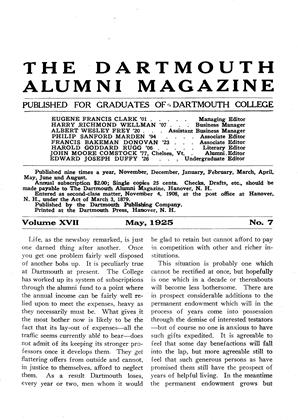A meeting of the Trustees of Dartmouth College was held in their room in the Parkhurst Administration Building in Hanover, N. H., on Monday, April 13, 1925 at nine o'clock in the forenoon.
There were present the President, and Messrs. Parkhurst, Thayer, Brown, Gile, Lord, Little, Howland, DuBois and Tuttle.
The President made an extended verbal "ireport upon the affairs of the College.
Various matters of business were presented by the President and were acted upon according to his recommendation, as follows :
Elections
Jacob D. Tamarkine was elected by ballot as Visiting Lecturer in Mathematics, with the rank of Assistant Professor.
William S. Rush was elected by ballot Assistant Professor of Modern Art.
Appointments
The fallowing appointments were made: James Mackaye to be Visiting Lecturer in Philosophy.
Herbert Faulkner West to be Instructor in Comparative Literature.
Paul T. Ellsworth to be Instructor in Economics.
W. Byers Unger to be Instructor in Biology.
Chauncy H. Allen to be Instructor in Psychology.
Leave of absence
Leave of absence was voted as follows: John H. Gerould, Professor of Biology, for the academic year 1925-26.
Foster E. Guyer, Professor of French, for the second semester of the academic year 1925-26.
Stuart Messer, Professor of Latin, for the second semester of the year 1925-26.
John W. Young, Professor of Mathe- matics, for the academic year 1925-26.
Erville B. Woods, Professor of Sociology, for the first semester of the academic year 1925-26.
Charles A. Proctor, Professor of Physics, for the second semester of the academic year 1924-25.
Howard F. Dunham, Assistant Professor of French, for the second semester of the academic year 1924-25.
Eric P. Kelly, Assistant Professor of English, for the academic year 1925-26.
John W. Glynn, Jr., Instructor in Latin, for the academic year 1925-26.
Promotions
The following promotions were mad", by ballot:
Arthur H. Basye to full Professor of History.
Bruce Knight to Assistant Professor of Economics.
William E. Utterback to Assistant Professor of Public Speaking.
Special Fellowships
Voted to appropriate funds to provide for special fellowships of $1200 each for the academic year 1925-26, to be awarded to John Hurd, Jr., and to Donald Bartlett.
Gift of George Baker
Voted that the President be requested to transmit to Mr. George Baker the appreciation of the Trustees for his recent gift of $100,000 to the College.
Amendment to Selective Process
In order to preserve the present wide distribution of the undergraduate body among a large number of secondary schools, it was
Voted: That the following be added to the statement of principles governing the selection of candidates to the freshman class as accept- ed by the Trustees in their meeting of Oc- tober 28, 1921: "It will be the policy of the College not to accept for admission, to any class from any one secondary school more than four percent of the number to be admitted to that class."
Automobiles
Voted,: That students of the College desirous of having or operating motor vehicles while in attendance at Dartmouth College, be required to present the written consent of their parents and to secure permission from the Dean, this action to go into effect on May first.
Report of Professor Richardson on the Liberal College
The Clerk was directed to write to Professor Leon B. Richardson expressing the great interest of the Trustees in his report, entitled A Study of the Liberal College, and their high appreciation of its value.
Purpose of Previous Vote Relating to Fraternity Houses
Whereas at the meeting of the Trustees held November 13, 1920 it was "Voted that the plans and location of proposed new fraternity houses shall require the approval of the Trustees," and it now appears desirable that some of the principles governing the administration of this policy be available to fraternities contemplating new construction,
Voted: That the Trustees record the purpose of the vote as two-fold: Ist, to protect the fraternities themselves by forestalling competition for elaborate quarters; 2nd, to secure houses which will harmonize with the rest of the college plant and the village of Hanover where the colonial type predominates.
This involves: (a) The longstanding limitation of the number of students permitted to room in a house to sixteen;
(b) that buildings be of a residential type rather than a Club house type, usually with the main cornice line of the house at the top of the second story;
(c) that the houses be of a good grade of construction but not elaborate or out of proportion with fraternity houses built in recent years; and
(d) that the total size be limited to 95,000 cubic feet, this being figured on outside dimensions and the height being computed from the basement floor to the average line of the roof, open porches not being included in this figure, also
Voted: That the same limitation and approval be required for any material enlargement of existing fraternity houses.
 View Full Issue
View Full Issue
More From This Issue
-
 Article
ArticleTHE COLLEGE AND PHYSICAL FITNESS*
May 1925 By WM. R. P. EMERSON, M. D. -
 Article
ArticleA CRITIQUE OF "THE LIBERAL COLLEGE"
May 1925 -
 Article
ArticleWHEN THE KING OF FRANCE CAME TO DARTMOUTH
May 1925 By Eric P. Kelly 1906 -
 Article
ArticleLife, as the newsboy remarked
May 1925 -
 Class Notes
Class NotesCLASS OF 1917
May 1925 By Ralph Sanborn -
 Article
ArticleThe Attitude Unworthy
May 1925
Article
-
 Article
ArticlePublications Arbiter
January 1939 -
 Article
ArticleJudicial overhaul
SEPTEMBER 1987 -
 Article
ArticleTHE BALLOT SEASON
June 1929 By Albert I. Dickerson -
 Article
ArticleThe Faculty
January 1955 By HAROLD L. BOND '42 -
 Article
ArticleSOCCER
DECEMBER 1972 By Jack DeGange -
 Article
ArticleThayer School
February 1955 By WILLIAM P. KIMBALL '29


